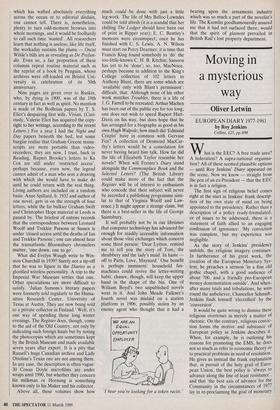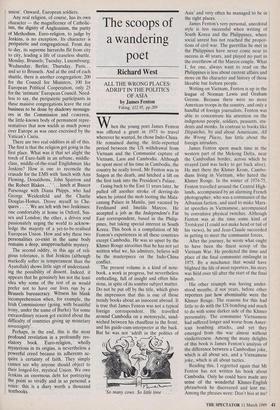Moving in a mysterious way
Oliver Letwin
EUROPEAN DIARY 1977-1981 by Roy Jenkins Collins, £25, pp.698
What is the EEC? A free trade area? A federation? A supra-national organisa- tion? All of these seemed plausible options — until Roy Jenkins' Diary appeared on the scene. Now we know — straight from the pen of an ex-President — that the EEC is in fact a religion.
The first sign of religious belief comes right at the start in Jenkins' frank descrip- tion of his own state of mind on being appointed to the presidency. Rather than a description of a policy ready-formulated, or of issues to be addressed, there is a statement of faith allied to an engaging confession of ignorance: 'My conviction was complete, but my experience was negligible.'
As the story of Jenkins' presidency unfolds, the religious imagery continues. In furtherance of his great work, the creation of the European Monetary Sys- tem, he preaches a sermon 'in a fine old gothic chapel, with a good audience of about 700, and a friendly pro-European money demonstration outside'. And when, after many trials and tribulations, he wins round the unbeliever, Chancellor Schmidt, Jenkins finds himself 'electrified' by the 'conversion'.
It would be quite wrong to dismiss these religious overtones as merely a matter of rhetoric. On the contrary, religious convic- tion forms the motive and substance of European policy as Jenkins describes it. When, for example, he is outlining his reasons for promoting the EMS, he does not so much as refer to economic theory or to practical problems in need of resolution. He gives us instead the frank explanation that, in pursuit of the holy grail of Euro- pean Union, the best policy is 'always to advance along the line of least resistance', and that 'the best axis of advance for the Community in the circumstances of 1977 lay in re-proclaiming the goal of monetary union'. Onward, European soldiers.
Any real religion, of course, has its own character — the magnificence of Catholic- ism, the dignity of Anglicanism, the purity of Methodism. Euro-religion, to judge by Jenkins, is no exception. Its character is peripatetic and congregational. From day to day, its supreme hierarchs flit from city to city, leading a life of ceaseless shuttle. Monday, Brussels; Tuesday, Luxembourg; Wednesday, Berlin; Thursday, Paris... and so to Brussels. And at the end of each shuttle, there is another congregation: 200 for the Council for Ministers, 100 for European Political Cooperation, only 25 for the 'intimate' European Council. Need- less to say, the peripatetic participants in these massive congregations leave the real business to be done by shadowy monsign- ors in the Commission and COREPER, the little-known body of permanent repre- sentatives that now wields as much power over Europe as was once exercised by the Vatican's Curia.
There are two real oddities in all of this. The first is that the religion got going in the first place. What was it that set alight the torch of Euro-faith in an urbane, middle- class, middle-of-the-road Englishman like Jenkins? How is one to reconcile the crusade for the EMS with 'lunch with Ann Fleming, Donaldsons, John Sparrow and the Robert Blakes ..."... lunch at Buscot Parsonage with Diana Phipps, who had George Weidenfeld and the Charlie Douglas-Homes. Drove myself to Che- quers. . .'. We are left with two Jenkinses: one comfortably at home in Oxford, Sus- sex and London; the other, a driven soul passionately urging the world to acknow- ledge the majesty of a yet-to-be-realised European Union. How and why these two personalities co-exist in the same body remains a deep, unapproachable mystery.
The second oddity, in this age of reli- gious tolerance, is that Jenkins (although markedly softer in temperament than the Ayatollah) shows little sign of understand- ing the possibility of dissent. Indeed, it appears that he genuinely has not the least idea why some of the rest of us would prefer not to have our lives run by a Brussels bureaucracy. Witness his blank incomprehension when, for example, the Irish Commissioner (going, with beautiful irony, under the name of Burke) 'for some extraordinary reason got excited about the difficulty of countries giving up monetary sovereignty'.
Perhaps, in the end, this is the most profound revelation in a profoundly rev- elatory book. Euro-religion, wholly mysterious in its origins, is nevertheless a powerful creed because its adherents ac- quire a certainty of faith. They simply cannot see why anyone should object to their longed-for, mystical Union. We owe Jenkins an enormous debt for portraying the point so vividly and in so personal a voice: this is a diary worth a thousand textbooks.



























































 Previous page
Previous page